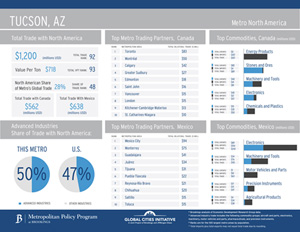Listen:

On Jan. 1, the North American Free Trade Agreement will have been in effect for 20 years.
In honor of the 20th anniversary of NAFTA, and last weekend’s NAFTA 20 Trade Summit, the Brookings’ Institution released its first examination of international trade between North America’s 100 major metropolitan areas.
The study highlights the importance of trade among individual cities in the continent.
“Canada is the United States’ top trading partner,” said Joseph Parilla, the paper's co-author and Brookings analyst. “Mexico comes in third just behind China. It’s critical that we rely on these countries for our imports and exports. But we’ve never really taken a look beyond a national level at how these trading relationships exist.”
Tucson has a very close relationship with the country’s third trading partner. The city's two largest international trade partners lay to the south: Monterrey and Mexico City.
“We sometimes think of trade occurring with these distant countries, with a lot of talk about China and Europe,” Parilla said. "But it’s really the trading partners in our own backyard that are really important for growing our economy going forward.”
Tucson Mayor Jonathan Rothschild is very aware of such importance.
He has focused on Tucson’s relationship with cities in Mexico since he took office about two years ago.
“When I came into office, one of the messages to me from the public was ‘look, we need jobs here in this community,’” he said. “I had to look for those areas, where there was an opportunity for jobs, maybe a little unique from other places around the country. And it was very evident that we are 60 miles from the border.”
That proximity plays a part in making Tucson a natural trade partner with Mexican cities, and there is a lot of industry in Mexico’s north.
"In Nogales, Sonora, there are eight Fortune 500 companies that have high-tech manufacturing plants,” Rothschild said. “When you go down to Jimez which is just a straight drive down the I-15, there are 34 multinational companies that are doing manufacturing work there, and it’s manufacturing work that is very complimentary to the work that we do here in Tucson.”
Manufacturing is not all that is needed for trade between cities.
“A lot of what ends up determining trading partners is the industry in which the cities are specializing,” Parilla said.
For instance, look at a company, such as The Offshore Group, which manufactures aerospace parts in Sonora. Their natural trade partner in the U.S. would probably be Tucson, a city with a large aerospace industry. But a company, such as Federal Electrical - located in Mexico City - which makes electronics components, is more likely to trade with Phoenix, a city whose main import and export is electronics.
Those trade relationships are incredibly important to people in the U.S.
“Trade with Canada and Mexico, both on the (importance) side and the export side, really sustain the quality of life that individuals across the U.S. enjoy,” Parilla said. “We depend greatly on these trade relationships to grow our own economy and grow jobs.”
Since municipal governments mostly manage that trade, the Brookings study contains a lot of information that local leaders can use.
“I think the main takeaway for a local state leader is to use this information to set an economic strategy or a vision for their particular city that takes into account their own industrial specialization, and understand who their key trading partners are,” Parilla said. “[They can] use that information to network with these trading partners, to establish relationships with them, to bolster trade going forward.”
That knowledge of who could be trading partners, what they could do to help a city is a good path to economic development.



By submitting your comments, you hereby give AZPM the right to post your comments and potentially use them in any other form of media operated by this institution.